#man gets used product from Amazon
Text
I'm always mystified by those pre-roll podcast ads where the hosts of a show you've never heard of (which bears no similarity or connection to the show you are listening to) greet you as if you are meant to care who they are and then proceed to read out the ad.
#Just give me a generic radio ad#I'll ignore that too#but I promise I'm not more inclined to use Amazon because of the recommendation of Thingy and Whatsit from Shagged Married Annoyed#Like I get that it's a cheap way to produce an ad and it advertises another podcast as well as the product#But it always seems to be pitched at people with very different podcast listening habits to me#Any ad that's like 'Hi we're .... and .... from hit podcast .... And we're here to talk to you about ....' 🙄#It's always so patently obvious that they don't know how to advertise to fiction podcast listeners#because it hasn't really occurred to them that those exist#The empty man rambleth
12 notes
·
View notes
Text
The one weird monopoly trick that gave us Walmart and Amazon and killed Main Street
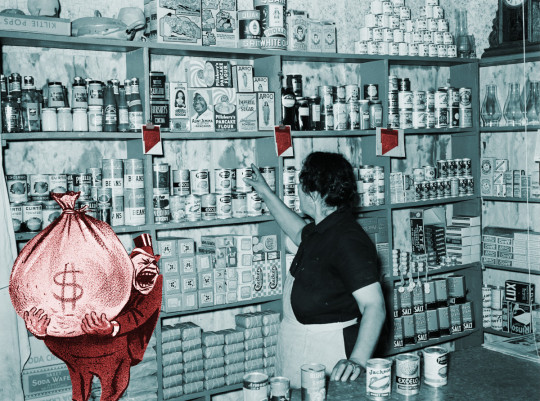
I'm coming to BURNING MAN! On TUESDAY (Aug 27) at 1PM, I'm giving a talk called "DISENSHITTIFY OR DIE!" at PALENQUE NORTE (7&E). On WEDNESDAY (Aug 28) at NOON, I'm doing a "Talking Caterpillar" Q&A at LIMINAL LABS (830&C).

Walmart didn't just happen. The rise of Walmart – and Amazon, its online successor – was the result of a specific policy choice, the decision by the Reagan administration not to enforce a key antitrust law. Walmart may have been founded by Sam Walton, but its success (and the demise of the American Main Street) are down to Reaganomics.
The law that Reagan neutered? The Robinson-Patman Act, a very boring-sounding law that makes it illegal for powerful companies (like Walmart) to demand preferential pricing from their suppliers (farmers, packaged goods makers, meat producers, etc). The idea here is straightforward. A company like Walmart is a powerful buyer (a "monopsonist" – compare with "monopolist," a powerful seller). That means that they can demand deep discounts from suppliers. Smaller stores – the mom and pop store on your Main Street – don't have the clout to demand those discounts. Worse, because those buyers are weak, the sellers – packaged goods companies, agribusiness cartels, Big Meat – can actually charge them more to make up for the losses they're taking in selling below cost to Walmart.
Reagan ordered his antitrust cops to stop enforcing Robinson-Patman, which was a huge giveaway to big business. Of course, that's not how Reagan framed it: He called Robinson-Patman a declaration of "war on low prices," because it prevented big companies from using their buying power to squeeze huge discounts. Reagan's court sorcerers/economists asserted that if Walmart could get goods at lower prices, they would sell goods at lower prices.
Which was true…up to a point. Because preferential discounting (offering better discounts to bigger customers) creates a structural advantage over smaller businesses, it meant that big box stores would eventually eliminate virtually all of their smaller competitors. That's exactly what happened: downtowns withered, suburban big boxes grew. Spending that would have formerly stayed in the community was whisked away to corporate headquarters. These corporate HQs were inevitably located in "onshore-offshore" tax haven states, meaning they were barely taxed at the state level. That left plenty of money in these big companies' coffers to spend on funny accountants who'd help them avoid federal taxes, too. That's another structural advantage the big box stores had over the mom-and-pops: not only did they get their inventory at below-cost discounts, they didn't have to pay tax on the profits, either.
MBA programs actually teach this as a strategy to pursue: they usually refer to Amazon's "flywheel" where lower prices bring in more customers which allows them to demand even lower prices:
https://www.youtube.com/watch?v=BaSwWYemLek
You might have heard about rural and inner-city "food deserts," where all the independent grocery stores have shuttered, leaving behind nothing but dollar stores? These are the direct product of the decision not to enforce Robinson-Patman. Dollar stores target working class neighborhoods with functional, beloved local grocers. They open multiple dollar stores nearby (nearly all the dollar stores you see are owned by one of two conglomerates, no matter what the sign over the door says). They price goods below cost and pay for high levels of staffing, draining business off the community grocery store until it collapses. Then, all the dollar stores except one close and the remaining store fires most of its staff (working at a dollar store is incredibly dangerous, thanks to low staffing levels that make them easy targets for armed robbers). Then, they jack up prices, selling goods in "cheater" sizes that are smaller than the normal retail packaging, and which are only made available to large dollar store conglomerates:
https://pluralistic.net/2023/03/27/walmarts-jackals/#cheater-sizes
Writing in The American Prospect, Max M Miller and Bryce Tuttle1 – a current and a former staffer for FTC Commissioner Alvaro Bedoya – write about the long shadow cast by Reagan's decision to put Robinson-Patman in mothballs:
https://prospect.org/economy/2024-08-13-stopping-excessive-market-power-monopoly/
They tell the story of Robinson-Patman's origins in 1936, when A&P was using preferential discounts to destroy the independent grocery sector and endanger the American food system. A&P didn't just demand preferential discounts from its suppliers; it also charged them a fortune to be displayed on its shelves, an early version of Amazon's $38b/year payola system:
https://pluralistic.net/2022/11/28/enshittification/#relentless-payola
They point out that Robinson-Patman didn't really need to be enacted; America already had an antitrust law that banned this conduct: section 2 of the the Clayton Act, which was passed in 1914. But for decades, the US courts refused to interpret the Clayton Act according to its plain meaning, with judges tying themselves in knots to insist that the law couldn't possibly mean what it said. Robinson-Patman was one of a series of antitrust laws that Congress passed in a bid to explain in words so small even federal judges could understand them that the purpose of American antitrust law was to keep corporations weak:
https://pluralistic.net/2023/04/14/aiming-at-dollars/#not-men
Both the Clayton Act and Robinson-Patman reject the argument that it's OK to let monopolies form and come to dominate critical sectors of the American economy based on the theoretical possibility that this will lead to lower prices. They reject this idea first as a legal matter. We don't let giant corporations victimize small businesses and their suppliers just because that might help someone else.
Beyond this, there's the realpolitik of monopoly. Yes, companies could pass lower costs on to customers, but will they? Look at Amazon: the company takes $0.45-$0.51 out of every dollar that its sellers earn, and requires them to offer their lowest price on Amazon. No one has a 45-51% margin, so every seller jacks up their prices on Amazon, but you don't notice it, because Amazon forces them to jack up prices everywhere else:
https://pluralistic.net/2024/03/01/managerial-discretion/#junk-fees
The Robinson-Patman Act did important work, and its absence led to many of the horribles we're living through today. This week on his Peoples & Things podcast, Lee Vinsel talked with Benjamin Waterhouse about his new book, One Day I’ll Work for Myself: The Dream and Delusion That Conquered America:
https://athenaeum.vt.domains/peoplesandthings/2024/08/12/78-benjamin-c-waterhouse-on-one-day-ill-work-for-myself-the-dream-and-delusion-that-conquered-america/
Towards the end of the discussion, Vinsel and Waterhouse turn to Robinson-Patman, its author, Wright Patman, and the politics of small business in America. They point out – correctly – that Wright Patman was something of a creep, a "Dixiecrat" (southern Democrat) who was either an ideological segregationist or someone who didn't mind supporting segregation irrespective of his beliefs.
That's a valid critique of Wright Patman, but it's got little bearing on the substance and history of the law that bears his name, the Robinson-Patman Act. Vinsel and Waterhouse get into that as well, and while they made some good points that I wholeheartedly agreed with, I fiercely disagree with the conclusion they drew from these points.
Vinsel and Waterhouse point out (again, correctly) that small businesses have a long history of supporting reactionary causes and attacking workers' rights – associations of small businesses, small women-owned business, and small minority-owned businesses were all in on opposition to minimum wages and other key labor causes.
But while this is all true, that doesn't make Robinson-Patman a reactionary law, or bad for workers. The point of protecting small businesses from the predatory practices of large firms is to maintain an American economy where business can't trump workers or government. Large companies are literally ungovernable: they have gigantic war-chests they can spend lobbying governments and corrupting the political process, and concentrated sectors find it comparatively easy to come together to decide on a single lobbying position and then make it reality.
As Vinsel and Waterhouse discuss, US big business has traditionally hated small business. They recount a notorious and telling anaecdote about the editor of the Chamber of Commerce magazine asking his boss if he could include coverage of small businesses, given the many small business owners who belonged to the Chamber, only to be told, "Over my dead body." Why did – why does – big business hate small business so much? Because small businesses wreck the game. If they are included in hearings, notices of inquiry, or just given a vote on what the Chamber of Commerce will lobby for with their membership dollars, they will ask for things that break with the big business lobbying consensus.
That's why we should like small business. Not because small business owners are incapable of being petty tyrants, but because whatever else, they will be petty. They won't be able to hire million-dollar-a-month union-busting law-firms, they won't be able to bribe Congress to pass favorable laws, they can't capture their regulators with juicy offers of sweet jobs after their government service ends.
Vinsel and Waterhouse point out that many large firms emerged during the era in which Robinson-Patman was in force, but that misunderstands the purpose of Robinson-Patman: it wasn't designed to prevent any large businesses from emerging. There are some capital-intensive sectors (say, chip fabrication) where the minimum size for doing anything is pretty damned big.
As Miller and Tuttle write:
The goal of RPA was not to create a permanent Jeffersonian agrarian republic of exclusively small businesses. It was to preserve a diverse economy of big and small businesses. Congress recognized that the needs of communities and people—whether in their role as consumers, business owners, or workers—are varied and diverse. A handful of large chains would never be able to meet all those needs in every community, especially if they are granted pricing power.
The fight against monopoly is only secondarily a fight between small businesses and giant ones. It's foundationally a fight about whether corporations should have so much power that they are too big to fail, too big to jail, and too big to care.

Community voting for SXSW is live! If you wanna hear RIDA QADRI and me talk about how GIG WORKERS can DISENSHITTIFY their jobs with INTEROPERABILITY, VOTE FOR THIS ONE!

If you'd like an essay-formatted version of this post to read or share, here's a link to it on pluralistic.net, my surveillance-free, ad-free, tracker-free blog:
https://pluralistic.net/2024/08/14/the-price-is-wright/#enforcement-priorities
#pluralistic#Robinson-Patman Act#ftc#alvaro bedoya#monopoly#monopsony#main street#too big to jail#too big to care#impunity#regulatory capture#prices#the american prospect#Max M Miller#Bryce Tuttle#a and p#wright patman
2K notes
·
View notes
Text
Dead Man's Dust

Intent: For preventing spirits from following you home.
Ingredients:
1 pt Chili Pepper (any type)
1 pt Salt
1 pt Basil
1 pt Garlic Powder
1⁄2 pt Dill
1⁄2 pt Lemon Peel
Optional: Add a pinch of Curry or Cumin for extra oomph.
Note: Powdered versions of most herbs are available online. I recommend Starwest Botanicals and Penn Herbs for quality products at reasonable prices. Also, if you can get your hands on a good electric spice grinder, you can make your own powder from dried herb products. If you don't have premade powdered herbs, grind each ingredient separately to produce fine powder. Sieve the material through the mesh strainer into the collection dish; this removes the larger unground pieces and gives you cleaner powdered herb. (Pro-Tip: Putting a funnel under the mesh strainer reduces lost material and makes collection much easier.)
Combine the component powders in the collection dish, mix well, and bottle immediately. Label with the name, date, and ingredients for future reference.
This powder performs one of the functions of Banishing Powder, but with special attention to warding off pesky ghosts. After visiting historical or haunted locations, or any time you feel spooked while walking home, sprinkle a palmful of powder on the ground and scrape your feet on it (as if you were wiping off dirt) to keep anything ghostly from following you home. Take three steps backward and spit toward the powder, then continue on your way.
For extra protection, toss a pinch of Banishing Powder, Threshold Powder, or Black Salt over your doorstep when you get home.
Note: For safety's sake, make sure you never cast this powder
into the wind and wash your hands after use. Leftover particles
on your skin can cause pain and irritation if they come into
contact with your eyes or breathing passages.
-adapted from Pestlework: A Book of Magical Powders & Oils, (c) 2017 by Bree NicGarran
(If you’re enjoying my content, please feel free to drop a little something in the tip jar or check out my published works on Amazon or in the Willow Wings Witch Shop. 😊)
#This powder is available for sale in the Willow Wings Witch Shop!#witchcraft#witchblr#witch community#potions and powders#Pestlework#spooky season#witch tips
674 notes
·
View notes
Text
Fly Boy
Pair: Neil Lewis x Fem!Reader
Summary: Frustrated with Neil's rule about the employees being required to cosplay, you decide to mess with him.
Warnings: SMUT; 18+; Neil is a bit pathetic and mean at points; he can't find the clit but has a big dick lol

“Surely, you’ve seen something by Milos Foreman.” Neil held a stack of VHS that needed to be reset. It was mostly older stuff, you saw the worn copy of Persona in the middle. He and Jonathan had a heated argument (or discussion, as they referred to it) about why the customer would stop watching in the middle, but you understood. Only the men deeply involved in film could possibly enjoy something so bad. Too trained to think black and white meant that it was a good movie automatically.
You shrugged, continuing to put the tapes on the shelf. “Never heard of him.” Paisa slid in right next to the edge of the shelf and The Red and The White. Only this place would have a section dedicated to foreign language war films. Like it would kill him to buy a copy of Shrek 2.
He nearly dropped the tapes on the counter and looked at you as if you just admitted to a horrible crime. “How have you never heard of him? One Flew Over the Cuckoo’s Nest? The Fireman’s Ball? ” Just because you heard of the movie didn’t mean you knew every production assistant’s name. You watched movies for fun. They just weren’t your taste.
“More like The Fireman’s Balls.” You stifled a laugh at your own joke, though Neil was far from impressed or amused at all.
He put a tape into the rewinder and shook his head. “We’re gonna fix that. This Saturday.”
“Can’t do this Saturday.” He continued his quite bewildered stare at you. Of course, he forgot. “It’s your little Star Wars marathon night.”
He nodded with realization. “Right.”
His slight frown made you feel guilty, as it always did. Somehow, the grown man always managed to use puppy eyes on you successfully. “We’ll watch them. Soon.” He continued to rewind the tapes with a smile.
Star Wars wasn’t exactly your cup of tea. Boring was the descriptive term that rested on the tip of your tongue whenever the topic was brought up in the store. Not that you would ever admit that out loud. All three of them gave you a college-level lecture when you suggested that the Chanel boots-wearing Luke might have been into men. God forbid you had fun.
The costumes for women were slim, at least they were on Amazon. Your options were Padme, Leia, Rey, or some random obscure character from a show or cartoon you’d never heard of. A part of you wanted to make felt ears and be Jar Jar Binks just to piss them off.
There was still a way to mess with them, Neil especially. Hopefully, the extra you paid for overnight shipping was worth it and actually pulled through.
By Saturday, you walked into Gumshoe with a large coat covering your costume. You braided your hair to the best of your abilities, trying to get as accurate as possible. The fabric of the costume was uncomfortable, digging into your skin and surely leaving marks you’d feel for days after.
Nerds crowded the small store, much more than usual. It was events like this one that made you reconsider your employment and how much you were a fan of movies in general. A Darth Vader brushed by you with a red solo cup of beer. Not many women were there, other than a few of the regulars dressed as Padme and Ahsoka.
Neil, in Han Solo’s iconic white shirt with the navy blue vest (the version from Return of the Jedi ), waved you over to join the couch with him, Jonathan, and Lucian. A New Hope was in the VHS player and ready to start, the original cut before George Lucas made revisions of course. He was so proud of winning the Etsy bid for the original set of VHS tapes.
You dropped the coat as you walked over and draped it on the front counter, locking eyes with the group as the costume was finally revealed: The bikini Leia wears at the beginning of Return of the Jedi. A part of you was anxious about the amount of skin you were showing and the people who were staring daggers into you. All you cared about was Neil’s reaction.
None of them said a word as you sat down on the couch next to them. “So, when’s this movie going to start?” Three pairs of eyes just looked back at you, more specifically, how your breasts bounced when you sat down and the thin straps that held the cloth that covered your panties. All you wore to work were t-shirts and jeans, along with the occasional tank top that left much to the imagination. You leaned over to the table and took the can of beer that Neil had been drinking, bringing it to your lips.
Neil cleared his throat. “Um, right now, actually.” He called everyone to the couches and rug, made a quick introduction to the night and thanked everyone for coming, then started the movie. You couldn’t help but notice the way his hands were clasped in front of his crotch and the bulge he was trying to hide.
Another person, dressed as Obi-Wan Kenobi in the third film, sat next to you. Only fifteen minutes in, he did the classic “fake yawn” in order to wrap his arm around your shoulders. He wasn’t slick, but as much as you noticed the attempt at flirting, Neil did as well. He shifted uncomfortably in his seat, turning his attention back to the movie and trying not to make his glances towards you too obvious.
The can of beer didn’t last you too long, only until they were in the trash compactor. There was no way that you would get through the rest of these movies sober and a half-can of beer wasn’t going to get you there.
You got up and walked to the storage closet, where you knew that a full case of beer was hidden. Finally alone, you pulled out a can and opened it, allowing the lukewarm liquid to coat your throat. The beer was still a bit disgusting, but it got the job done. “What the fuck are you wearing, Princess?”
Neil stood in the doorway, closing the door behind him. You shrugged, even though you knew that he knew you were getting to him on purpose. “I’m participating. You never let me live down the Lord of the Rings night when I wore my regular clothes.”
He sighed and shook his head. “I didn’t mean to whore yourself out and wear practically nothing.”
“It’s accurate, not whoring out. Are you mad that I’m wearing it or that people are looking at me in it? What is it, Fly-boy?” You crossed your arms, unknowingly pushing your breasts together and creating more cleavage than there already was.
He ran a hand through his hair. “Christ, Y/n.” His hands cupped your cheeks and he pulled you in, crashing his lips against yours. It was a side of him you’d never seen before, his eyes were dark and only focused on you. Your back hit the wall and Neil’s hands traveled lower, pulling the string that held the bra together and ripping fabric until it fell to the floor.
“Now, beg me to fuck you like the whore that you’ve been parading yourself as all night. I know that’s what you want.” His hot breath burned your neck as he trailed his lips from your mouth to your collarbone. His words cut deeply, like nothing you’d expect to come from his mouth. Who knew sweet Neil could turn into this?
You nodded. “Please, Neil. I need you to fuck me. I’ve wanted you for so long.” He moaned against your skin as you spoke and hastily unbuckled his belt, freeing his aching cock. You untied the bottom of your costume and dropped your panties with it.
His chest pressed against yours and you winced as the cold wall came in contact with your bare skin. He wasted no time in lining his tip with your entrance and pushing in, softly moaning into your neck. “You’re so warm. You’re not a whore, I’m sorry. I didn’t mean that. Fuck.”
So, he really was all talk. Once he felt the touch of a woman, he became a needy mess. “It’s okay, Neil. Just, ah!” It was now that you finally understood the saying about nerdy boys and the size of their cocks, feeling him hit spots you didn’t know existed. You only hoped that the ongoing battle within whatever galaxy or solar system was louder than both of your unholy gasps and moans.
You would never hear the end of it if Jonathan or Lucian heard. They gave you enough shit for Neil’s unbelievably obvious crush on you that you chose to avoid on behalf of keeping peace in the store. Clearly, you had failed miserably in that aspect. Look at Neil’s cute face.
Not to mention his cock. The same cock currently driving into you and knocking the wind from your lungs. Neil fucked into you like he was on a time limit, chasing his climax and nearly sinking his teeth into your bare shoulder. “Your tits are mesmerizing.” You held back a laugh at his comment, reaching down to your clit before he slapped your hand away. “No, let me do it.”
A part of you wanted to deny it, but you let him. He blindly reached down and rubbed your labia, thinking he was on the money. You squeezed your eyes shut and gently guided his fingers to your clit, jolting when he found the right spot. “Oh, Neil…so good.”
His pace slowed and became less controlled. “I’m so close, sweetheart.”
“You’ll pull out, right?” He bit his lip and nodded. By the way he held tightly onto your hips and breathed in your scent, you knew that he barely heard your request.
The suspicion turned into fact when he stilled, pushing himself further into you as he came. “I’m sorry, baby. I’ll pay for the pill. You’re just…so warm.”
You nodded along with him, not caring as you crossed the finish line as well. As you both came down from the high, the realization kicked in. He tucked himself in his boxers and buttoned his pants. You picked up your shirt, well, bra. The straps were broken. “Shit, Neil. I can’t wear this.”
He furrowed his brows, then rummaged through one of the boxes in the corner of the room. A large, baby blue t-shirt with the Gumshoe logo on it was in his hands. “Put this on. Say you got too cold.”
You caught the shirt and put it on, watching the fabric fall to your knees. “Great.”
“You still look sexy.” He shoved his hands in his pockets and looked you up and down.
You rolled your eyes. “What does Leia say to Han Solo? Nerf-Herder? You’re that."
#cillian murphy x reader#neil lewis x reader#neil lewis x you#watching the detectives#cillian murphy#odiesdayoff
252 notes
·
View notes
Text
ACT 1, SCENE 2: blue lock headcanons

nagi found out amazon product testers were a real thing, and he had never been more happy in his entire life. if he wasn't training to become a professional football player, that would have been his dream job.
sae became a victim of the cat distribution system the moment he moved to spain. he left his window open once, and he came back to a whole secret society of strays on his fire escape.
aryu used to watch his mother do her makeup in the bathroom every morning. after she left for work, he would use her hair curlers and nail polish to bedazzle himself. if you ever ask him to do your makeup, he would tilt your chin up with one hand and ever so gently swipe on your lipstick for you.
kaiser is a whore for attention, even if it is bad attention. if you're not listening to him during dinner, he would most definitely steal the food right off your plate whilst maintaining eye contact. gives you the most shit-eating grin once you catch him.
rin genuinely cannot function around the female species. sometimes his aunties make small talk during family gatherings, and he just sits awkwardly with his baby cousin in his arms. the baby almost always cries.
sae still uses his ipod from 2005. he doesn't have any interest in music, so he mostly uses it as a white noise filler during long flights. if you send him a song recommendation though, he will listen to it.
rin kept a diary as a teenager with some of the entries completely filled with angsty scribblings about sae. he definitely had an entire section somewhere dedicated to death and existentialism. the second half of his journal is reserved solely for you though. he sometimes doodles flowers in the margins.
raichi is chronically online. he would be the type to have an entire four-page argument with a stranger in the youtube comment section. sometimes you have to remind him that the outside world actually exists, and he needs to go outside and touch grass.
sae is secretly intrigued by artists. like how can you just transfer an image from your head onto paper? is it some sort of magic? he cannot wrap his mind around anything that isn't concrete and tangible. he sometimes walks through the streets of madrid just to spy on the old people painting the sea. if you made a drawing of him, he would internally malfunction.
isagi used to help his mother with knitting and sewing. he even learned how to crochet one summer but forgot all about it once he got into football. would not complain if you asked him to do laundry or iron clothes. he is (most of the time) very sweet and kind.
bachira does not have a sleep schedule. what is sleep? he only knows 24/7 hyperactivity and the demons under his bed. would wake you up at the crack of dawn just to go hang out in some random abandoned parking lot.
sae has to physically restrain himself whenever he does shoots for brand endorsements. he would definitely tell the truth if the product was low-quality while literally being on set for its commercial. this man does not lie. cannot model for the life of him. he lost his ability to smile a long time ago, and he feels viscerally ill every time a camera is shoved into his face. if you're there to accompany him though, he will straighten up and at least attempt to look enthusiastic.
rin is terrible at any sort of class that involves creative writing. however, he does enjoy reading haikus. it's the only form of poetry he can understand. definitely sends you one when he misses you.
reo is clueless whenever you tell him that you feel ugly in your outfit. like where is the ugliness? all he sees is the most stunning person in the world. definitely recommend taking him shopping. he would go into the fitting rooms with you and give you the most encouraging confidence boost you have ever felt.
sae has the strongest enamel in existence because he bites his popsicles right off the stick. rin tried to do that once and ended up getting brain freeze.
yukimiya is the type to go from 0 to 100 in less than a millisecond. if anyone says anything remotely negative about you, he will definitely make sure they do not live to see the light of day. he does all this with the most charming smile on his face too.
shidou has no table manners. he would be the messiest eater in existence. if the dining hall looks like a velociraptor just barraged through, you know shidou was there. he only uses a napkin because you told him to.
rin wears chelsea boots and women's clothing. he has a collection of trench coats in his closet, and they're one of the only things he's incredibly proud of. at least he beats sae when it comes to fashion sense.
ness would pack you lunch every day without you even asking for it. he also uses those glittery animal toothpicks and cuts your apples into hearts. his paper notes are little menacing though. usually it has your name written a thousand times in blood red ink.
sae would let you braid flowers into his hair, but he would wrinkle his nose in embarrassment if you ever took a picture of it. he tries to act nonchalant when you gush about how pretty he is because in his mind he looks incredibly stupid. will keep that photo by his bedside and look at it when he's lonely though.
isagi is incredibly clumsy. sometimes he will act like an egomaniac before falling right on his face. the world has an interesting way of humbling him. he does keep his mood swings in check when you're around though. your presence gives his mind inner peace.
otoya has color-coded folders for every girl he has dated. he keeps their names, likes, dislikes, and contacts all separately filed so he doesn't confuse them. however, on your night out, he got so caught up in talking to you, he forgot to even update your file. the date ended with him smiling like a damn fool. you're always the exception.
aiku is the type to just be casual about everything. he just got into a car accident while on call with you? that's okay because he got to hear your pretty voice on facetime. he took a tidal wave straight to the face while ogling you at the beach? that's no problem because he got a sneak-peek at your cute little bathing suit. this man literally has no sense of self-preservation when it comes to you.
bachira was the kid who tried to mix up weird concoctions at the school lunch table. now it translates into drinking both an energy drink and americano at once. you had to pull him away from the soda fountain because he kept trying to add every single drink combination possible into his red solo cup.
sae would blatantly stare at your ass and then tell you it was for research purposes. if you press further, he will pull up the statistics showing how buttock size correlates with athletic ability.
rin is obsessed with tea only because he saw his brother drink it at family dinners. he always sat up straight on the zabuton and sipped the bitter leaf juice as a way to impress the grown-ups. unfortunately for him, he developed a caffeine addiction in his late teens.
niko would be the tech-savvy person in your relationship. he doesn't believe in traditional flowers, so he codes you an entire HTML webpage with roses on the user interface. he also wholeheartedly believes that virtual pets are real pets.
shidou is an adrenaline junkie. he has six piercings, two of which are helix. he also snowboards during the winter and speeds on the highway for fun. (don't be like shidou, kids.)

© verysium 2023 / please do not translate, repost, or plagiarize any of my works
#blue lock#bllk#fics#nagi seishiro#sae itoshi#shidou ryusei#oliver aiku#michael kaiser#alexis ness#aryu jyubei#raichi jingo#niko ikki#rin itoshi#bachira meguru#otoya eita#yukimiya kenyu#isagi yoichi#nagi x reader#sae x reader#shidou x reader#aiku x reader#kaiser x reader#michael kaiser x reader#ness x reader#aryu x reader#rin x reader#rin itoshi x reader#sae itoshi x reader#raichi x reader#bachira x reader
888 notes
·
View notes
Text
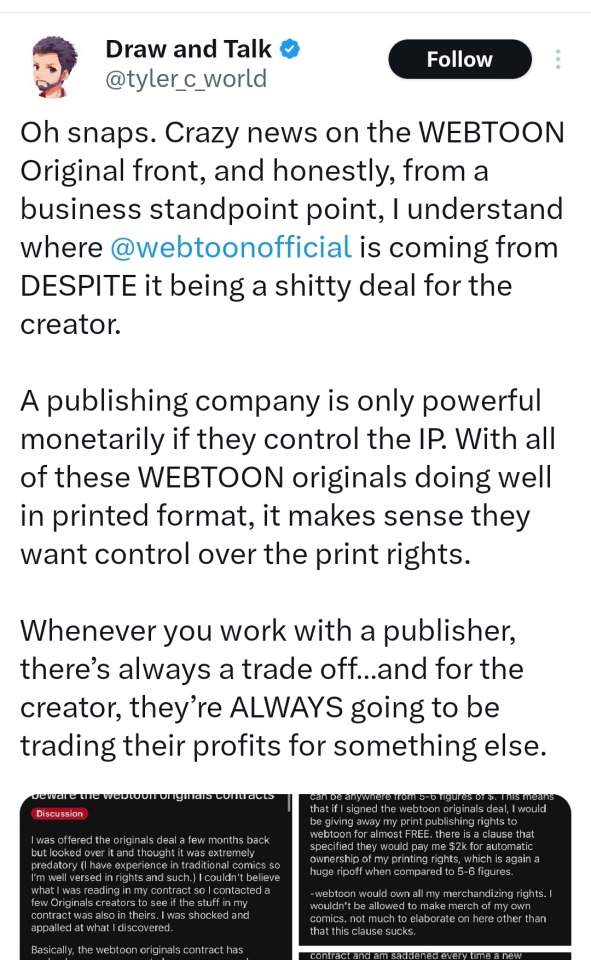

NOBODY needs to be defending these people. Major publishers, studios, streaming services, Tesla, Apple, Adobe, Amazon, social media companies- there isnt a single altruistic bone caught in their teeth. Profit from the output of exploited and captive labor IS their product now. When their contacts look like the one in question, the company is clearly stating that shareholders are the customers, not us!
Why else would it be anything but a stupid idea for Amazon to just nuke the majority of Comixology's self-published titles when they consolidated their services? If our experience was really foremost in their minds, why would they repeatedly purge, censor, demonitize, bury, and delete popular accounts with robust followings if not to allay the moral brainworms of shareholders and investors?
Forfeiting rights to our IP is not a "shitty deal," it's surrendering any potential ability to make money off of your own creative work. It's selling your property to a board of accountants to pitch into a portfolio. It's theirs to trot out as long as it's profitable and bury the instant its projected profit dips too close to the cost of maintenance. Hell, we've seen services drop popular series just because their projected profits started to flatten out! Mothballing it also has the added bonus of removing it from the market to further minimize potential competition. Like how there just weren't spider man movies for ages because the owner of the property didn't think it was worth developing but worth too much to sell.
They will make more money from suing you for trying to reclaim IP they mothballed than you did selling it to them in the first place. I guaranteee their budget for lawsuits is a lot deeper than the one they pay their "original" artists from.
By virtue of being a big, profitable, corporation, "their" IP is going to have an astronomically higher value in a court of law than any individual creator. The financial "damage" will be higher for infringing on their copyrights than any amount you can claim on your own. When it becomes theirs, their connections, their infrastructure, their reputation makes it an asset with much more value than you or I can possibly claim. So if you try to steal a bite back from them it's a bite of a *potentially* multimillion-dollar series. In their eyes, they bought the totality of your work, which you agreed was worth the price they gave you. It's value becomes more dependent on who owns it than whether it's even good.
You may not have the same potential to become flash-in-the-pan, short-term succesful without their resources, but you will still own your rights to distribute, alter, preserve, promote, and negotiate your share if you still own your work. That is worth everything as a creator who is passionate about what you've made and committed to protecting it.
The most effective power we can exercise as artists is our ability to say, "no" when someone else wants to pay us a disadvantageous fraction of our worth. You may lose potentially lucrative opportunities but "opportunities" presented by companies like Facebook or Twitter, whose real product is a platform for ads and data collection, with content as bait, are not opportunities to thrive on as independent artists. This specifically is an opportunity for the company to acquire property.
The myth that the publisher's strength is something for us to exploit, without them getting the lion's share is a trap that they feed from at will.
People like the poster up top are opportunists who see the process as a pipeline towards trading low-investment content for financial treats and maybe a share of ad revive. They're stalking horses for companies to exploit more talented but less experienced artists who are facing a daunting and overwhelming market where their work becomes harder and harder to show, let alone sell. A quick deal may feel like a win but it's selling the cow to save money on bottling the milk. Artists like this serve the publisher by making it seem like signing away your rights are just a necessary part of the game. However it's a game they are playing with exceedingly cheap stakes that weren't going to succeed on their own merit. So what if Mr. Business Perspective loses rights to his sexy Mario Bros. parody to a huge company? The point was always to unload it because it's a product, a bartering chip, a trinket. He's a Business Man, so he sees tactics that maximize profits to the business as maximizing their ability to buy whatever shiny tripe he cranks out. The business is his customer, not the reader. The business is his ally, not the creative community. Fuck him and fuck anyone who tells you the exposure is worth a damn if you don't retain rights to your work.

116 notes
·
View notes
Text
"The End of the World is a Product".
I don't normally make....any posts, but the Fallout show, and some of the response to it has me wanting to actually put some words down here. There will be spoilers for the Fallout show if you want to avoid that.
Several people whose opinion I respect a lot have their own thoughts on the show, Amazon making it, and general disappointment with where Fallout as an IP has gone in the several decades it has existed. I agree with a lot of these statements and think that Fallout peaked with New Vegas, and Bethesda's ownership and usage of the IP has been uninspired at best.
That said, I did watch the show. And generally, I liked it. I have some complaints (like, wtf if the Brotherhood even doing? Who is really in charge? The writers *blew up* the NCR, just like that? For....some reason?) The main thing I have an issue with, is the dissonance between the message of the show, and the company that made it.
I think the parts that really made the show were Coop's flashbacks to before the war. I love his character, so much. And from Coop, The Ghoul, I get my dissonance.
We see him interacting with general Hollywood. It's basically the same as ours. Despite what Some People(tm) will say, Hollywood is a tool of the United States Machine. An extension of the country's will. Coop is making a cowboy movie, one of many he has made. He expresses being uncomfortable with his new movie's seeming obsession with killing, not wanting his character to kill the villain when he is begging for his life. The director tells him "people want to see a good man pushed too far." We see later, after the war, Coop made the movie the way the director wanted.
Coop's wife works in marketing, or something like it, for Vault-Tec. Coop likes the idea of the Vaults at first. Save people from the end of the world. Good stuff, thinks Coop. He was in the Marines, fought at Anchorage. He believes in protecting people and his country. So when his wife asks him to do an ad for Vault-Tec, he says yes.
Very quickly, he leaves making movies, and basically now works for Vault-Tec. Has a big party, invites a bunch of his friends, and only one of his acting friends shows up. Says everyone else declined on moral grounds, because they don't like Vault-Tec, and all the other mega corporations working with them or around the world. Coop's friend mentions he sold his voice/a character he created to the company that makes Mr. Handy's, and how everyone and everything is a product now, and embracing that is the only way to make money anymore. "You're a product, I'm a product, the end of the world is a product."
Coop later meets one of his acting friends, Charles Whiteknife, to talk about the party and why he didn't go. Charles brings up Vault-Tec, the mega corporations, and "Fiduciary Responsibility". I never, ever, in my mind would think a Fallout show, executive produced by "Thanks" Todd Howard, would bring that up.
Charles lays it out for Coop: Vault-Tec makes money selling Vaults. If they want to make money, then everyone's fear of the end of the world is really what is for sale. The end of the world is the product.
So no peace talks to calm down the war between the US and China. No safe feeling. They need fear. They want to make money, so you cannot feel safe. We see a prelude at Coop's earlier party: two Vault-Tec executives are talking about heading off those exact peace talks before anything definite is done so quarterly profits go up. Even the president is mentioned as missing, but that could be a kidnapping or a reference to the Enclave.
Coop doesn't want to believe that. Why would his wife work there if that was the case?
We see, as the flashbacks go on, how much she knows, but won't give away. She needs her job so her family can get into "one of the good Vaults". Coop ends up spying on a meeting between his wife, a Vault-Tec exec, and a bunch of major corporations and private entities. A nice cameo set up for big fans. We see West-Tek, Big MT, ROBCO, all of them. Vault-Tec wants them to buy into the Vaults, so they can make money.
So they can control the end of the world.
They think a total monopoly in the post-apocalypse will save the world from war.
Then the real reveal: Vault-Tec, in order to make guarantees on their experimental Vaults, and to make guarantees to the investors, is going to drop the bomb. Maybe not all of them, but definitely start the Great War.
Because it will make them money now, and when the world is over, they can rule over the ashes with a gaggle of experimented-on, traumatized survivors, brainwashed to do what they want, and led by the preserved executives that helped end the world.
"Well, thanks for the spoilers, RedSparrow, but what is the point?"
Well, when people write about the future, like George Orwell did in 1984, or Ray Bradbury in Fahrenheit 451, or even Suzanne Collins in Hunger Games, they weren't really writing about the future. They were writing about the problems they dealt with in their present, exaggerated to make them stand out.
"What happens when the cattle ranchers own half the town?" Charlie Whiteknife asks Coop when they meet at the bar.
"The town burns down."
"Exactly. The ranchers are in charge now."
This isn't really new stuff for Fallout, if you have played any of the games beyond 3,4, or 76. (Hell, 76 tries to act like Vault-Tec are the good guys for some stupid ass reason.)
We now live in that moment. Maybe we didn't when Fallout 1 came out, or maybe it was easier to hide then. At this point, it's nearly impossible to really ignore, and anyone saying that is incorrect or a good thing is just burying their head in the sand to avoid the truth.
Maybe we don't have Vaults, or Vault-Tec, but we have Amazon, selling us everything and grinding employees to dust on vague promises of earning a living.
We have our own ROBCO, and the CEO of our version of ROBCO bought Twitter because his ex left him for a trans woman and is currently trying to sell losers online his idea of a sex bot and shitty cars that rust and explode.
We have social media monopolies that live off of hate-engagement and spreading fear. Hell, the US government is banning social media platforms they can't control, and privatizing things like internet access through Starlink. Elongated Muskrat tried to cut off Ukraine's access to it after one of their generals told him to shut up and stop sucking up to Russia.
None of this is new. I'm probably sounding like your weird boomer uncle online right now.
But your weird boomer uncle doesn't think they will end the world.
But they will.
So here's the dissonance I struggle with: why is Amazon, one of the many companies enshitti-fying everything right now, making a show that tells you the plan?
It's easier to imagine the end of the world, than it is to imagine the end of capitalism, so the saying goes.
But the end of the world is the plan of capitalism. That's the end goal.
And it's wild to me that the Fallout show, made by Amazon, is the one telling us this.
48 notes
·
View notes
Text
Cw/ stalking.
Could you imagine stalker gaz who just falls in love with you after seeing your profile... on amazon.
All he can see is the things you've bought and reviewed. What is this man thinking? He sees your account while trying to find his friend a gift for her brithday, he clicks the link of some cute clips, seems girly enough, he scrolls down to the reviews and lo and behold, a picture of the clips in your hair, your face is half obscured, cute, he hums to himself and without really thinking clicks on your profile. He scrolls down your reviews, feeling himself grinning at the funny little comments you have about everyday products. but that doesn't mean Gaz doesn't scan the background, take note of anything he could recognise, nothing stops him from downloading every picture from your amazon, saving them onto his computer, digital footprint, sweetheart, what if he was a bad man?
He reverse image searches it onto Google, finding the same picture used in a reddit post, fuck, now we're getting somewhere, he mutters to himself.
He can't help it, you're so witty and charming, of course he's reading all your comments, he doesn't even know what the hell you're doing on a subreddit all for rice cookers but he doesn't care, as long as you're happy. 6 hours later and hes already went through all your public social media's, instragram, twitter, every tweet he found funny, he's just screenshotted it and put it in the folder, he doesn't need to bombard you with likes or retweets. All your Instagram photos are already saved in his hardrive. He goes to sleep smiling, knowing he'll have someone to come home to after a long deployment.
When he wakes up the next day, he's already got the surveillance equipment at his doorstep, Amazon Prime, nifty thing. Now, to put it to good use.
#ive always loved his last name#kyle gaz garrick#kyle gaz x reader#gaz x reader#i forgot how to tag#cod mwii#cod modern warfare
48 notes
·
View notes
Text
Unfinished Timeline for an Untitled Setting
Critique and advice is more than welcome, though please be nice about it. Goes up to about 2081 rn, though I plan to get at least another 50 years further in before I get to the time I want the bulk of the setting to be set in.
Timeline:
2022: First controlled break-even fusion reaction, followed by first controlled net-gain fusion reaction.
2025-2026: Increasing unrest in USA leads to mass riots outside the white-house. Sweeping reforms after growing revolts threaten to become a major armed rebellion. NASA miraculously left untouched, general increase in standard of living. Economic crisis narrowly averted.
2027: First nuclear thermal rocket (NTR) tested in orbit by NASA and DARPA. GPT-style language modeling declared “dead end” for self-aware AI.
2030: First Lunar base established under NASA Artemis program. Suez Canal temporarily blocked by a poorly driven cargo ship again. Evergreen Shipping goes bankrupt.
2034: Lunar Gateway established under joint NASA, ESA, JAXA, DLR, ASI, and CNSA. Lunar helium-3 mining declared officially nonviable. Radial detonation engines become standard for lower ascent stages, SpaceX Starship, NASA SLS, and Roscosmos Soyuz phased out. Drop in launch prices.
2034-2036: Additional modules added to the Lunar Gateway from SpaceX, KARI, ISRO, and Roscosmos. Lunar Gateway Collaborative Group (LGCG) established consisting of all current contributors to the station.
2036: First commercial fusion energy plant reaches full operation in France under ITER. Mass production of Tritium begins. First fully private space station under SpaceX. Asteroid mining corporations begin formation. Establishment of Nigerian Organization for the Development of Space (NODS). Ecuador experiences communist revolution.
2036-2037: First manned martian mission under LGCG, first human footsteps on another planetary body.
2037: Elon Musk assassinated. New SpaceX leadership declares plans for space elevator. North Korea collapses, Korean peninsula unified under South Korean leadership, becoming simply Korea. Indian nuclear stockpile secretly surpasses 50000 Gt. First baby born on the moon.
2040: Artemis base becomes semi-self sufficient, producing it’s own food and air from hydroponics, and water from mined lunar ice. Lunar LH2 and hydrolox production begins. Lunar population passes 100.
2040-2042: First commercial fusion power plants established in the US, UK, Australia, Korea, and Japan.
2042: A joint US Government and SpaceX black operation destabilizes Ecuador, leading to a corporate takeover of the territory.
2044: Korea, Japan, the Philippines, Vietnam, Malaysia, Indonesia, Papua New Guinea, Australia, and New Zealand form West Pacific Trade Organization (WPTO). Construction of the base of SpaceX’s planned space elevator begins off the coast of Ecuador.
2047: LCC completed at CERN. Mission for permanent martian base declared. Major economic crisis in China, intervention from several megacorps results in a decrease in Chinese government power and increase in corporate control in the region. SpaceX space elevator counterweight construction begins in geostationary orbit.
2048: Major revolution in quantum mechanics brought on by new data from the LCC. Lunar population passes 250.
2050: China splits into 4 corporate states, Amazon Corporate Territory (ACT) with its capitol in Chongqing, Samsung Independent State (SIS) with its capitol in Shanghai, Territory for Electronic Developments (TED) made up of Apple and Microsoft with its capitol in Yinchuan, and the Chinese Corporate Union (CCU) made up of several formerly state-owned corporations with their capitol in Wuhan and possession of the Three Gorges Dam. Beijing becomes an independent city-state controlled by the former Chinese government, retaining control over the CNSA. Massive revolution in battery energy density. Permanent martian base established by LGCG.
2051: Breakthrough in photon manipulation, beamed energy and solar collection becomes increasingly viable. Many asteroid mining corps branch into solar power, notably Binghamton Vacuum Mining Solutions (BVMS). Lunar population passes 500.
2052: Martian population surpasses 100.
2053: Martian base reaches semi-self sustainability.
2055: All 4 Chinese corporate states and the Beijing city state form the Chinese Federation for Space Exploration (CFSE), supplanting the old CNSA. Lunar Gateway module renamed and LGCG roster amended accordingly. SpaceX space elevator cable completed, first test cart sent to GEO. WPTO begins construction of a space elevator in the Banda Sea.
2056: SpaceX space elevator declared complete, commercial operation begins.
2057: BVMS surpasses $1T in net worth, becomes primary supplier of energy for the Artemis Lunar Base. Lunar Population surpasses 1k, massive migratory population surge begins following influx of energy from BVMS. Martian population surpasses 250. First fusion reactor in Ecuador.
2058: WPTO space elevator counterweight begins construction in GEO.
2060: First fusion reactors in Nigeria and India. First large-scale solar collector on Earth constructed in New York operated by BVMS. Large population surge in Binghamton NY. Lunar population surpasses 5k. Martian space station established. Regulations for GEO development established.
2061: First lunar-built spacecraft flown. Secondary lunar settlement founded by CFSE. Massive influx of funds for the WPTO space elevator from the CFSE, GEO counterweight construction begun. Lunar Gateway population surpasses 100. First fusion reactor in the Democratic Republic of the Congo (DRC), Congo space agency (DRCSA) founded.
2064: WPTO space elevator cable completed, declared complete and opened to commercial operation.
2065: BVME establishes unmanned Mercurian base. CFSE settlement population surpasses 100. Martian population surpasses 500. Lunar Gateway population surpasses 200.
2066: Mass expansion of Artemis Base life support systems using BVMS produced automated construction equipment. Aerostat scientific outpost established by LGCG.
2067: Microbial life discovered on Venus. Venus outpost (and LGCG) acquires substantial funding boost. Artemis base population surpasses 2.5k and begins to plateau.
2069: Unmanned mission to Europa announced by LGCG, plans to use BVMS automated platforms to drill into subsurface ocean established. Martian base purchases automated construction equipment from BVMS, massive population boon ensues. CFSE settlement population surpasses 750. Lunar gateway population surpasses 500. Martian base population surpasses 500. BVME becomes the largest corporate entity in the system.
2070: BVMS performs feasibility study on gas giant aerostat mining platforms.
2071: Study of Venusian lifeforms disproves Earth-Venus panspermia.
2073: BVMS tests laser-sail propulsion on small unmanned craft.
2075: LGCG Europa mission discovers multicellular aquatic life in Europa’s subsurface ocean. Plans for a dedicated research base drafted.
2076: Multi-corporate base established on Ceres to facilitate further asteroid belt mining. BVMS intentionally excluded from this project.
(System effectively split into quarters: Past Venus under BVMS, Between Venus and Mars under LGCG, belt under Multi-corporate mining control, outer system unclaimed.)
2077: GEO-Lunar cycler niche mostly filled by Intraplanetary Transport Services corp (ITS).
2080: Permanent scientific base established at the Europa Breach Point (EBP) with mostly automated systems and a small (5 human) management and maintenance crew.
2081: Panspermia further disproved by study of Europan life. Massive object detected in Jupiter’s lower atmosphere. BVMS begins mission to establish a mining aerostat on Saturn, utilizing laser sail propulsion to transport equipment.
(Saturn Aerostat site intended for use in the further colonization of the outer solar system and the Uranus planetary system itself. Atomic Rockets page)
12 notes
·
View notes
Text
Diverse Sherlock Holmes adaptations
for you to watch on major streaming services to make Racists, sexists and homophobes mad
SPOILERS are always marked as such! Read on own risk!
1. The irregulars - Available on Netflix - cancelled after one season

John Watson is a black gay man (canon, confirmed in the show) in this supernatural adaptation of Sherlock Holmes.
The main character is Bea, played by Thaddea Graham a Chinese-Irish (queer?) actress

2. Miss Sherlock - closed in one season, available on HBO Asia, HBO max (?) Hulu and Amazon prime America and DVD

This adaptation plays in Japan. Both Sherlock and John are Japanese woman. Wato (John) is traumatized war doctor for Red Cross. Her trauma is important for the story. Sherlock is autistic coded and has a chocolate addiction. SPOILER SPOILERS SPOILERS Spoilers Moriarty is a female in this adaptation. While Mary is male.
3. Elementary - closed in seven seasons - available on prime, CBS and many more as well as DVDs

In this adaptation John is a female Chinese American. Her Sherlock is both queer as well as neurodivergent coded, but it was never confirmed inside the show, only outside, so this is why he is not pictured her
Johns close colleague and best friend is Markus bell, an American black man

Mrs Hudson is a trans woman

Sherlocks girlfriend is autistic
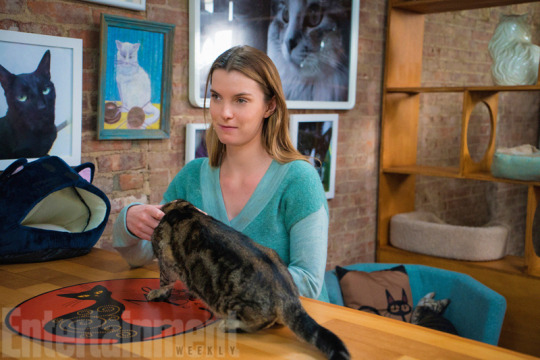
SPOILER SPOILER SPOILER SPOILER SPOILER:

Moriarty is a woman in this one
We also have multiple other queer, disabled and people of color-side characters
4. Enola Holmes - two movies so far - available on Netflix

Watson is an Indian man in this one. Apart from that this adaptation is a not a shining light of representation but we will see where the road will lead us. This was already enough to make people mad…
SPOILERS SPOILERS SPOILERS SPOILERS
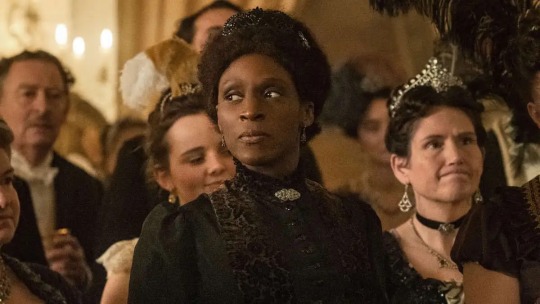
Moriarty is a black woman in this one and if we will get a third movie we will see more her soon!
5. Sherlock daughter - in production - Netflix


We honestly do not know anything about the adaptation so far, apart from that Sherlock will be played be a trans woman
#enola holmes#johnlock#the irregulars#miss sherlock#cbs elementary#Sherlocks daughter#Sherlock Holmes adaptations
169 notes
·
View notes
Text
Even if you think AI search could be good, it won’t be good
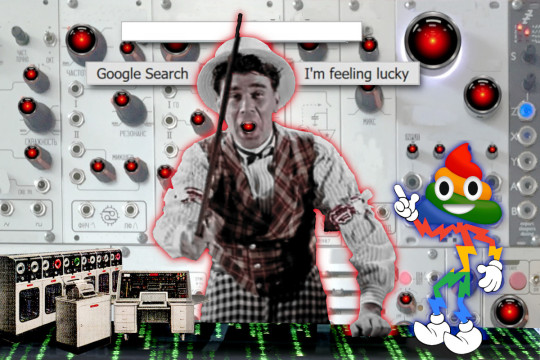
TONIGHT (May 15), I'm in NORTH HOLLYWOOD for a screening of STEPHANIE KELTON'S FINDING THE MONEY; FRIDAY (May 17), I'm at the INTERNET ARCHIVE in SAN FRANCISCO to keynote the 10th anniversary of the AUTHORS ALLIANCE.

The big news in search this week is that Google is continuing its transition to "AI search" – instead of typing in search terms and getting links to websites, you'll ask Google a question and an AI will compose an answer based on things it finds on the web:
https://blog.google/products/search/generative-ai-google-search-may-2024/
Google bills this as "let Google do the googling for you." Rather than searching the web yourself, you'll delegate this task to Google. Hidden in this pitch is a tacit admission that Google is no longer a convenient or reliable way to retrieve information, drowning as it is in AI-generated spam, poorly labeled ads, and SEO garbage:
https://pluralistic.net/2024/05/03/keyword-swarming/#site-reputation-abuse
Googling used to be easy: type in a query, get back a screen of highly relevant results. Today, clicking the top links will take you to sites that paid for placement at the top of the screen (rather than the sites that best match your query). Clicking further down will get you scams, AI slop, or bulk-produced SEO nonsense.
AI-powered search promises to fix this, not by making Google search results better, but by having a bot sort through the search results and discard the nonsense that Google will continue to serve up, and summarize the high quality results.
Now, there are plenty of obvious objections to this plan. For starters, why wouldn't Google just make its search results better? Rather than building a LLM for the sole purpose of sorting through the garbage Google is either paid or tricked into serving up, why not just stop serving up garbage? We know that's possible, because other search engines serve really good results by paying for access to Google's back-end and then filtering the results:
https://pluralistic.net/2024/04/04/teach-me-how-to-shruggie/#kagi
Another obvious objection: why would anyone write the web if the only purpose for doing so is to feed a bot that will summarize what you've written without sending anyone to your webpage? Whether you're a commercial publisher hoping to make money from advertising or subscriptions, or – like me – an open access publisher hoping to change people's minds, why would you invite Google to summarize your work without ever showing it to internet users? Nevermind how unfair that is, think about how implausible it is: if this is the way Google will work in the future, why wouldn't every publisher just block Google's crawler?
A third obvious objection: AI is bad. Not morally bad (though maybe morally bad, too!), but technically bad. It "hallucinates" nonsense answers, including dangerous nonsense. It's a supremely confident liar that can get you killed:
https://www.theguardian.com/technology/2023/sep/01/mushroom-pickers-urged-to-avoid-foraging-books-on-amazon-that-appear-to-be-written-by-ai
The promises of AI are grossly oversold, including the promises Google makes, like its claim that its AI had discovered millions of useful new materials. In reality, the number of useful new materials Deepmind had discovered was zero:
https://pluralistic.net/2024/04/23/maximal-plausibility/#reverse-centaurs
This is true of all of AI's most impressive demos. Often, "AI" turns out to be low-waged human workers in a distant call-center pretending to be robots:
https://pluralistic.net/2024/01/31/neural-interface-beta-tester/#tailfins
Sometimes, the AI robot dancing on stage turns out to literally be just a person in a robot suit pretending to be a robot:
https://pluralistic.net/2024/01/29/pay-no-attention/#to-the-little-man-behind-the-curtain
The AI video demos that represent "an existential threat to Hollywood filmmaking" turn out to be so cumbersome as to be practically useless (and vastly inferior to existing production techniques):
https://www.wheresyoured.at/expectations-versus-reality/
But let's take Google at its word. Let's stipulate that:
a) It can't fix search, only add a slop-filtering AI layer on top of it; and
b) The rest of the world will continue to let Google index its pages even if they derive no benefit from doing so; and
c) Google will shortly fix its AI, and all the lies about AI capabilities will be revealed to be premature truths that are finally realized.
AI search is still a bad idea. Because beyond all the obvious reasons that AI search is a terrible idea, there's a subtle – and incurable – defect in this plan: AI search – even excellent AI search – makes it far too easy for Google to cheat us, and Google can't stop cheating us.
Remember: enshittification isn't the result of worse people running tech companies today than in the years when tech services were good and useful. Rather, enshittification is rooted in the collapse of constraints that used to prevent those same people from making their services worse in service to increasing their profit margins:
https://pluralistic.net/2024/03/26/glitchbread/#electronic-shelf-tags
These companies always had the capacity to siphon value away from business customers (like publishers) and end-users (like searchers). That comes with the territory: digital businesses can alter their "business logic" from instant to instant, and for each user, allowing them to change payouts, prices and ranking. I call this "twiddling": turning the knobs on the system's back-end to make sure the house always wins:
https://pluralistic.net/2023/02/19/twiddler/
What changed wasn't the character of the leaders of these businesses, nor their capacity to cheat us. What changed was the consequences for cheating. When the tech companies merged to monopoly, they ceased to fear losing your business to a competitor.
Google's 90% search market share was attained by bribing everyone who operates a service or platform where you might encounter a search box to connect that box to Google. Spending tens of billions of dollars every year to make sure no one ever encounters a non-Google search is a cheaper way to retain your business than making sure Google is the very best search engine:
https://pluralistic.net/2024/02/21/im-feeling-unlucky/#not-up-to-the-task
Competition was once a threat to Google; for years, its mantra was "competition is a click away." Today, competition is all but nonexistent.
Then the surveillance business consolidated into a small number of firms. Two companies dominate the commercial surveillance industry: Google and Meta, and they collude to rig the market:
https://en.wikipedia.org/wiki/Jedi_Blue
That consolidation inevitably leads to regulatory capture: shorn of competitive pressure, the companies that dominate the sector can converge on a single message to policymakers and use their monopoly profits to turn that message into policy:
https://pluralistic.net/2022/06/05/regulatory-capture/
This is why Google doesn't have to worry about privacy laws. They've successfully prevented the passage of a US federal consumer privacy law. The last time the US passed a federal consumer privacy law was in 1988. It's a law that bans video store clerks from telling the newspapers which VHS cassettes you rented:
https://en.wikipedia.org/wiki/Video_Privacy_Protection_Act
In Europe, Google's vast profits lets it fly an Irish flag of convenience, thus taking advantage of Ireland's tolerance for tax evasion and violations of European privacy law:
https://pluralistic.net/2023/05/15/finnegans-snooze/#dirty-old-town
Google doesn't fear competition, it doesn't fear regulation, and it also doesn't fear rival technologies. Google and its fellow Big Tech cartel members have expanded IP law to allow it to prevent third parties from reverse-engineer, hacking, or scraping its services. Google doesn't have to worry about ad-blocking, tracker blocking, or scrapers that filter out Google's lucrative, low-quality results:
https://locusmag.com/2020/09/cory-doctorow-ip/
Google doesn't fear competition, it doesn't fear regulation, it doesn't fear rival technology and it doesn't fear its workers. Google's workforce once enjoyed enormous sway over the company's direction, thanks to their scarcity and market power. But Google has outgrown its dependence on its workers, and lays them off in vast numbers, even as it increases its profits and pisses away tens of billions on stock buybacks:
https://pluralistic.net/2023/11/25/moral-injury/#enshittification
Google is fearless. It doesn't fear losing your business, or being punished by regulators, or being mired in guerrilla warfare with rival engineers. It certainly doesn't fear its workers.
Making search worse is good for Google. Reducing search quality increases the number of queries, and thus ads, that each user must make to find their answers:
https://pluralistic.net/2024/04/24/naming-names/#prabhakar-raghavan
If Google can make things worse for searchers without losing their business, it can make more money for itself. Without the discipline of markets, regulators, tech or workers, it has no impediment to transferring value from searchers and publishers to itself.
Which brings me back to AI search. When Google substitutes its own summaries for links to pages, it creates innumerable opportunities to charge publishers for preferential placement in those summaries.
This is true of any algorithmic feed: while such feeds are important – even vital – for making sense of huge amounts of information, they can also be used to play a high-speed shell-game that makes suckers out of the rest of us:
https://pluralistic.net/2024/05/11/for-you/#the-algorithm-tm
When you trust someone to summarize the truth for you, you become terribly vulnerable to their self-serving lies. In an ideal world, these intermediaries would be "fiduciaries," with a solemn (and legally binding) duty to put your interests ahead of their own:
https://pluralistic.net/2024/05/07/treacherous-computing/#rewilding-the-internet
But Google is clear that its first duty is to its shareholders: not to publishers, not to searchers, not to "partners" or employees.
AI search makes cheating so easy, and Google cheats so much. Indeed, the defects in AI give Google a readymade excuse for any apparent self-dealing: "we didn't tell you a lie because someone paid us to (for example, to recommend a product, or a hotel room, or a political point of view). Sure, they did pay us, but that was just an AI 'hallucination.'"
The existence of well-known AI hallucinations creates a zone of plausible deniability for even more enshittification of Google search. As Madeleine Clare Elish writes, AI serves as a "moral crumple zone":
https://estsjournal.org/index.php/ests/article/view/260
That's why, even if you're willing to believe that Google could make a great AI-based search, we can nevertheless be certain that they won't.

If you'd like an essay-formatted version of this post to read or share, here's a link to it on pluralistic.net, my surveillance-free, ad-free, tracker-free blog:
https://pluralistic.net/2024/05/15/they-trust-me-dumb-fucks/#ai-search

Image:
Cryteria (modified) https://commons.wikimedia.org/wiki/File:HAL9000.svg
CC BY 3.0
https://creativecommons.org/licenses/by/3.0/deed.en
--
djhughman
https://commons.wikimedia.org/wiki/File:Modular_synthesizer_-_%22Control_Voltage%22_electronic_music_shop_in_Portland_OR_-_School_Photos_PCC_%282015-05-23_12.43.01_by_djhughman%29.jpg
CC BY 2.0
https://creativecommons.org/licenses/by/2.0/deed.en
#pluralistic#twiddling#ai#ai search#enshittification#discipline#google#search#monopolies#moral crumple zones#plausible deniability#algorithmic feeds
1K notes
·
View notes
Text
Ghost-Be-Gone Powder

Intent: To banishing interloping spirits.
Ingredients:
2 pt Angelica Root
2 pt Basil (any type)
1 pt White Oak Bark
1 pt White Willow Bark
1⁄2 pt Bloodroot**
1⁄2 pt Black Salt
1⁄2 pt Sandalwood (if desired)
Note: Powdered versions of most herbs are available online. I recommend Starwest Botanicals and Penn Herbs for quality products at reasonable prices. Also, if you can get your hands on a good electric spice grinder, you can make your own powder from dried herb products.
If you don't have premade powdered herbs, grind each ingredient separately to produce fine powder. Sieve the material through a mesh strainer into a collection dish; this removes the larger unground pieces and gives you cleaner powdered herb. (Pro-Tip: Putting a funnel under the mesh strainer reduces lost material and makes collection much easier.)
Combine the component powders in the collection dish, mix well, and bottle immediately. Label with the name, date, and ingredients for future reference.
Use in magics intended to remove troublesome spirits from your home. Sprinkle in the corners of each room, and across thresholds and windowsills to banish unwanted spirits and prevent their return.
Cast a few pinches of Ghost-Be-Gone Powder out your front door or on your doorstep after performing a home cleansing or banishing ritual to help keep your home free of uninvited spirits. Keep a bottle of the powder in troublesome areas to help reduce problems with mild to moderate hauntings and make any spirits who wander in easier to remove. Including the powder in regular cleansing rituals also helps to keep out all but the most determined metaphysical pests.
Add a small amount of Sandalwood or your preferred incense powder to create a burnable mix for smoke-cleansing purposes. Be sure to ventilate your home well after censing as part of a spell or ritual. (Censing or heavy smoke-cleansing are not recommended for homes with pets, small children, or persons with respiratory ailments. Always let caution and common sense prevail when planning your workings.)
-adapted from Pestlework: A Book of Magical Powders & Oils, (c) 2017 by Bree NicGarran
(If you’re enjoying my content, please feel free to drop a little something in the tip jar or check out my published works on Amazon or in the Willow Wings Witch Shop. 😊)
#witchcraft#witchblr#witch community#witch tips#potions and powders#spells#spooky season#dealing with dead people#Pestlework
342 notes
·
View notes
Text
I kept seeing this skirt on Pinterest, and I loved it, so I made it. Out of curiosity, I timed how long it took me. Without counting cutting and adjusting a basic skirt block and making and adjusting a mock-up, this skirt took me 14 hours to make. I fiddled with the pleats and decided I wanted the waist band to sit differently, and took it apart and restyled and put it back together, so maybe cut it down to 11 hours of actually producing the skirt, which includes French seams, and hand stitching the waistband, buttons and hem.
I used OKEO-TEX Tencel, this two and a half yards was around 60 bucks.
Tencel is a fabric produced like rayon, from wood or bamboo fibers broken down by a chemical process and extruded into a yarn that can be woven into fabric. The process for rayon uses highly caustic and poisonous liquids, which are very often dumped in a way that destroys the environment (Rayon cannot legally he produced in the US because it can’t meet *any regulations*) The process for Tencel uses slightly less toxic chemicals, but more importantly is circular, meaning 99% of the materials used are recovered and reused, and it’s fully biodegradable making it one of the more sustainable types of fabric,even though it is a man made fiber.
I used kind of cheap buttons, and together with thread and interfacing that’s probably another 10 dollars.
So 70 in materials.
A living wage in the Twin Cites is about 23 an hour. That’s what it takes just to make rent and buy food and get by.
At 23 an hour the labor cost is $253.00.
But I have years of experience, I used some advanced techniques, and a living wage should be a base salary, so let’s call a fair, mid career wage for producing a product everyone needs, clothes, 36 an hour.
Labor cost now $396.00
Plus 70 in materials: $466.00
A little wear and tear on machinery and tools and incidentals like needles and chalk, maybe add 2 more dollars.
This one-off bespoke skirt costs $468.00 dollars. Theoretically.
Mara Hoffman sells a very similar skirt, with a Tencel/Linen blend and a catch stitch hem for $405.
Darling has a Linen/Rayon Blend without fine finishing for $135
Amazon has a polyester version for $30
Temu has a polyester one for $12
The point here is not “Only buy 500 dollar skirts” but all clothes are hand made and that labor has value.
All labor has value. We all should buy fewer clothes, but we should all be able to afford decent clothes.
A 12 dollar skirt is *nonsense* but so is only being able to afford clothes that won’t last more than a couple washes.
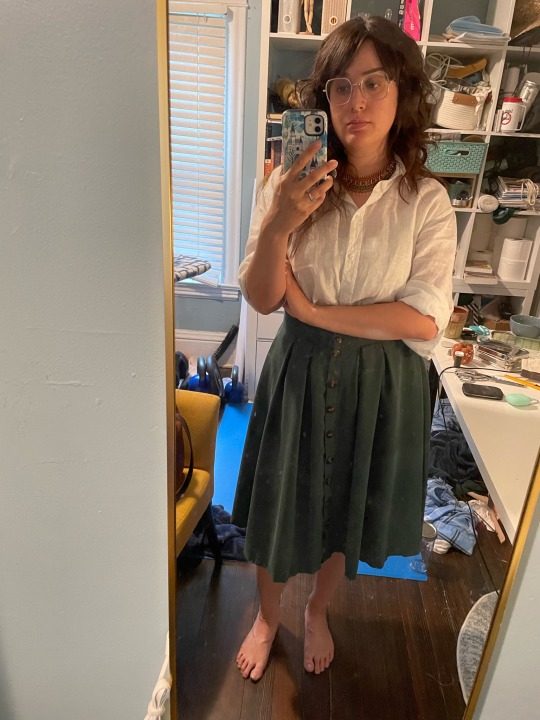
11 notes
·
View notes
Text
Cruel Summer: the hit that was meant to be?

Pictured: dramatic reenactment of us waiting for Cruel Summer to be a single for 4 years.
Background
This summer is the apocalypse.
-- Lover Journal entry, dated 29 August 2016
We all know about the cruel summer in question, right? To be fair, technically the cruelty of the summer stemmed from "a desperate summer love that might be doomed from the start" and "some element of desperation and pain in it, where you’re yearning for something that you don’t quite have yet", and not whatever Kim Kardashian was doing on Twitter, but given how those two events occured basically simultaneously, it's not outrageous to claim both experiences informed each other.
In 2018, Taylor went on the Reputation Stadium Tour. Between shows, Taylor started working on Lover, getting into the studio with Joel Little, Frank Dukes and our favourite producer Jack Antonoff. For Cruel Summer, however, there was something special: Annie Clark, better known as St. Vincent, was a credited writer on the track.
St. Vincent had worked with Jack for her 2017 album Masseduction, so much like how Lana ended up in the studio with Taylor, we can safely assume that Jack brought the two together. On 6 June 2018, St. Vincent mentioned that she had reworked one of her songs from Masseduction, Slow Disco, into a poppier production with Taylor's support. With this in mind, we can probably assume that she had cross passed with Taylor around this time. Taylor was papped recording at Electric Lady (Jack's stomping grounds) on 18 July 2018, which lines up with this theory. [1]
The failed single push
I’m not trying to blame the global pandemic that we had, but that is something that happened that stopped Cruel Summer from ever being a single.
-- Taylor Swift after performing Cruel Summer on tour in Pittsburgh, 17 June 2023
Cruel Summer had been a fan favourite from the get-go. When Taylor held listening parties for a select group of fans, it was the song that most people had positive feelings about. When Lover (the album) dropped in August 2019, it was the third most streamed track from the album, leapfrogging I Forgot That You Existed despite it being the second track. People started to lament the... poorly-received lead singles the album had. (I have nothing kind to say about those two tracks so I won't say anything.)
Then for a while, nothing happened. Taylor released Lover and The Man as singles to various degrees of success. The Man's disappointing (by her standards) chart run probably reignited discussion about how Cruel Summer would have smashed if it were only given a proper push and the GP had understood its talent. Then COVID came along, Lover Fest was delayed indefinitely, and it seemed that the Lover era was over, replaced by Taylor locking herself in with Joe Alwyn and drinking wine.
Then June 2020 came around, and...

Now how do we know that this is true? Apparently, Cruel Summer was added to AllAccess, a website where radio programmers download singles serviced to radio. While I can't verify this myself, I have seen numerous independent sources claim that Cruel Summer was uploaded to the site specifically on 17 June 2020. [2] Some radio website also ran with the story in early June, so I am inclined to believe this.
And it's not like there weren't any official hints...




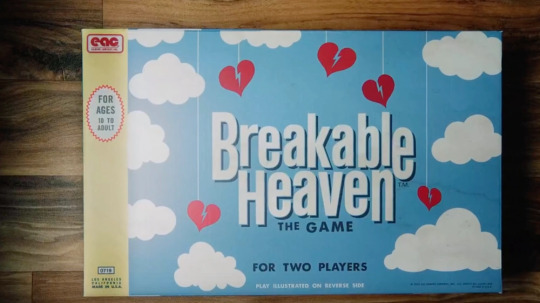
Top to bottom: Spotify "enhanced album" promo mural, You Need To Calm Down music video, Amazon Music commercial, Lover music video [3]
The catch, however, is the Cruel Summer never got an official add date. An add date is "supposed to tell [radio] stations when to add a record to its playlist". Without an official add date, stations usually won't play your new song unless it's really hotly requested.
So the song didn't get a full label push and quickly died off, despite getting some radio play in 2020 (from anecdotal evidence), not appearing on the charts. And then in July folklore came out of the blue, and with it ended the Lover era, and seemingly all hopes for Cruel Summer world domination.
A music video?
While Taylor HQ is normally as hard to infiltrate as Fort Knox, over the years bits and pieces of information have leaked about her intentions for the rest of the Lover era. Chief among them was, apparently, to officially release Cruel Summer as a single to accompany her live shows in the summer of 2020. A music video was even filmed, before being scrapped when Taylor moved into the mythical forest of folklore.
-- Official Singles Chart (UK), 27 June 2023
Well, would Official Singles Chart lie? They do say "apparently" though, maybe to hedge their bets a little.
The problem with this claim, however, is the timeline. On 27 January 2020, Taylor released The Man as a single. She dropped the music video on Feburary 28th. Assuming a similar rollout for Cruel Summer, the music video would've come out in July. Given how the pandemic had basically put all possible filming activity to a standstill in March, it seems implausible that a music video would be filmed that early in advance, especially without knowing that the pandemic was on the horizon. Or maybe it was fully CGI and filmed in the luxury of her LA house, I don't know.
But I think there's a different catch here. Note how the above source claims that Cruel Summer would have been a single to "accompany her live shows in the summer of 2020", namely Lover Fest. According to the planned Lover Fest schedule, by the summer of 2020 she would be performing in Europe, including headlining Glastonbury.
Now consider Taylor's usual single rollout. Fearless, Sparks Fly, Red and New Romantics were all the last or second-last singles pushed from their respective albums, all of which got tour videos. [4] It seems that given how Cruel Summer would be the fifth single pushed according to the original plans, it most likely would've gotten the tour video treatment as well. Which makes sense: imagine a music video with her performing under broad daylight to huge crowds at festivals!
Cruel Summer 2: The Return of the Hit
With the advent of the pandemic something interesting happened: people started re-discovering old songs and making them into hits again. Catalogue streaming amounted to a whopping 70% of all streams in 2022. Running Up That Hill, a song from the 1980s, went viral again thanks to Stranger Things and this new ability that
Maybe it was because people wanted something familiar to go back to in a world where nothing was familiar anymore. Who knows. Many other music critics have written better articles about this phenomenon. What does matter, however, is that releasing singles from an album from years ago was now commercially viable. Sia, Lady Gaga and The Weeknd all did it to various degrees of success.
So when Cruel Summer, a song which had been among Taylor's most streamed songs for a while, acted as the tour opener on the Eras Tour [5], it would only further gain in popularity from then onwards, even re-entering the Billboard Hot 100 before it was even officially promoted to radio. And so her label moved to capitalize on this trend, and finally released Cruel Summer as a single on 20 June 2023, almost 3 years to the day after its original planned release date.
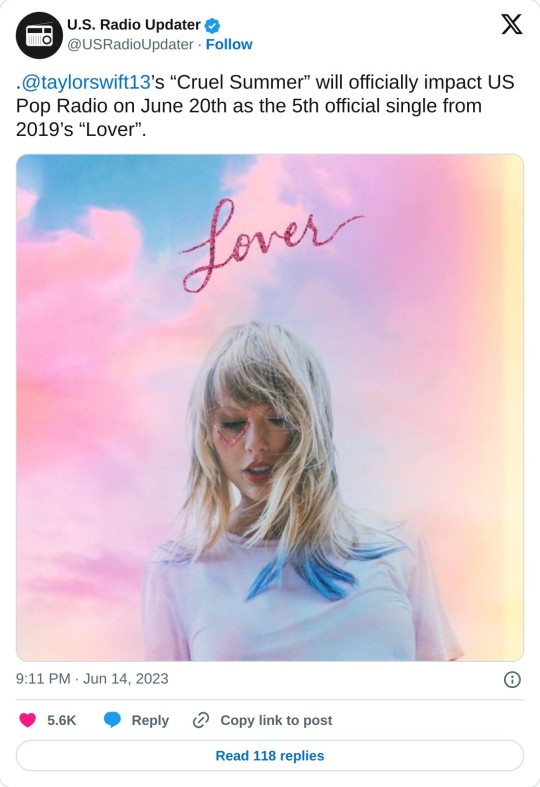
The million dollar question: would Cruel Summer have smashed if it was released as originally planned?
I'd say no. The general public had already moved on from Lover as the lacklustre The Man performance demonstrates. Besides, without the accumulation of popularity that Taylor had with folklore, evermore, the re-recordings, Midnights and the Eras Tour, who know where her career would've been?
(By the way, even if Cruel Summer had been the lead single there is absolutely no way it passes Old Town Road for #1.)
Timeline
Summer 2018: Cruel Summer is likely written around this time.
23 August 2019: Lover is released.
27 January 2020: The Man is released as a single.
27 February 2020: The Man music video is released.
5-12 March 2020: According to Steve from the IC, band rehearsals for Lover Fest took place during these days, with a whopping 32 songs.
19 March 2020: California enters lockdown due to COVID-19. Taylor was living in Los Angeles at this time.
17 April 2020: Lover Fest is officially delayed.
27 April 2020: Taylor writes cardigan, her first collaboration with Aaron Dessner and the beginning of the concept of folklore.
6 June 2020: Steve posts that cryptic message about folklore, signifying that the album was mostly complete by this time.
17 June 2020: Cruel Summer is uploaded to AllAccess, incidentally the same day as Steve teases cardigan.
20 June 2020: The European leg of Lover Fest would have begun on this day.
20 June 2023: Cruel Summer is officially released as a single.
23 October 2023: Cruel Summer hits #1 on the Billboard Hot 100.
Conclusion
Stream Cruel Summer.
[1] Cruel Summer is also the only Lover song to be registered on the US Copyright Office with a creation year of 2018, rather than 2019, suggesting that it was an early cut. (credit: @taylor-on-your-dash)
[2] Surprisingly, people have also claimed that I Did Something Bad was added to AllAccess in a similar fashion.
[3] That being said, if we take that hint in the Lover music video as hinting towards a Cruel Summer single push, this also means Afterglow was also meant to be a single...
[4] Do not quote me on this, Taylor herself didn't acknowledge that chorus of Miss Americana & The Heartbreak Prince either.
[5] Getaway Car should've been here...
23 notes
·
View notes
Text
Having a thought about how the amount of wealth Bruce comes into and then amasses for himself changed over the decades of Batman media, and the reason he's beeen scaled up to be so impossibly wealthy is probably because cities and companies in DC lore are analogs to real life places and companies.
Wayne Enterprises probably reflects how homogenous American multinational corporations are now, where a single company can make and distribute almost all consumer goods because it has bought out/merged hundreds of smaller companies + purchased everything it needed from the ground up so it does not depend on many others besides itself.
Just something that crossed my mind when I was looking up what WE actually does and the Fandom (bleh) wiki listed so many branches. Wayne Shipping? Wayne Foods? Like...is this Amazon and Bruce is now Bezos? Wayne Entertainment? He's also Disney? Wayne Electronics? This is Apple? Wayne Aerospace? Boeing??? Bruce is trying to be in control of and monitor every single means of production and every production line fr
Feel like that should influence how people view Wayne Enterprises and Bruce himself. Steadily creeping in and taking root in every industry. People get curious about a new construction project in the city, but once it's revealed to be a Wayne Tower it's filling people with dread. Though, it was a long time coming...everything you order online comes in a box with a W on the tape delivered to your address in a black as night truck with a giant W emblazoned on the side. The meds in your cabinet were produced under Wayne Pharmaceuticals. The cable and streaming services were recently bought by Wayne Entertainment. The Wayne Foundation started offering scholarships at the major college campuses. Your phone is Wayne tech. Your car was built with Wayne Steel. Soon the hospitals will be all Wayne Medical, your insurance company bought out. The local newspapers and stations will be bought up. The libraries. The clinics. The orphanages. The schools. The grocery store. You're never going to scrub that b ig soulless W out of your head. The way the logo looks like the head of a pitchfork, ready to stab and capture the intended prey.
Thinking about how Wayne Medical seems so innocuous in what it does except for the bit on how Bruce has access to every person in Gotham's medical records, because he can access the Wayne Medical databases and use that information to track suspects. And the thing is WE does not just exist in Gotham, it's a multinational corporation with bases in major cities not just in the U.S. but around the world. This man has millions of people's medical records easily accessible to him which feels both extremely unethical and extremely illegal. Not that civilians can prove he can and does access those records though.
#thinking about how bruce as a billionaire should be just as scary as the batman#maybe that's why the playboy persona came about...to distract from how terrifying it is to just see WE to swoop in and devour your city#sucking it of all that built it and made it the way it is and turning it into a living asset#You need scandals and tacky tabloid gossip to cover up the things the common people don't like#yeah sure it can be an act to the throw off *other elites* so they don't think he'll ever catch onto them or something#but if everyone is talking on the dc comics equivalent of twitter + insta + fb about Bruce's latest drunken or flirtatious stint#they're not talking about how the new investment Wayne Foods is going to monopolize the agriculture industry#buying hundreds of farms in the Midwest and so much livestock#If everyone's talking about Bruce's latest sweethearts and broken hearts#they're not talking about what patents and copyrights WE holds and how WE can ruin your life if you try to challenge or defy its claims#I just like thinking about the whole 'is Batman secretly a vampire' but with Bruce also being suspected for how WE conducts business#also thinking about corporate horror in the vein of people pointing out how sinister Amazon's logo is being an arrow resembling a thin smile#it made sense when the word amazon was there bc the arrow was pointing from A to the z...implying they had everything you can name#but now it's just a creepy ass thin smile on the side of those delivery vans#Wayne Enterprises but they reduced it from 'Wayne' on everything to just a W and then they made the W look so bulky and pronged#for lack of better description...also I think every Wayne Tower should carry the gothic aesthetics over regardless of where it's built#I think it should also be obnoxiously and carefully painted black so it also catches your eye from being the odd one out in a sea of beige#Bruce definitely has the money to make his presence as intimidating and goth as possible...tells the criminals who is gonna be boss now#ciboria rambles#bruce wayne
32 notes
·
View notes
Text
goodreads review excerpt time
John French takes an overly verbose axe to anything resembling a cohesive plot in this book.
Perhaps I am a bit to harsh with my rating but at the halfway mark, I could not help and say to myself; what is the point of this book?
I'll better stick to the painting side of 40k...
I continually suffered from a severe case of "I don't care what happens to these people" as he had introduced a cast so unlikable and grating that the highlight of the work was seeing the poet get the tar beaten out of him by a pack of Army soldiers.
And at some point, Angron shows up to make me ask "Who in their right mind would give Angron command of a Legion?"
As disappointing as the Emperor was with his sons.
Look, I know this isn't supposed to be high literature, but by God the writing in this one is bad.
"False Gods" reads like a 400 page treatise of a man moving little dolls around to make fights happen without any regard to their personalities or common sense
I wouldn't trust you to write an interesting Amazon product description out of five.
its only the lack of facial hair that prevents the villains from twirling their mustachios.
First off, let’s start with the negatives of this book, of which there are many.
But damn, it really seems like the author has never had an actual female friend he did not want to have a more intimate relationship with. Everything about the women in this book has to do with how feminine (or not) they appear, whether or not this is appealing and whether or not they are evil and cunning or pious and willing to endure the odd light sexual harrassment. The entire franchise could use more consistent and better use of female characters because mankind does not just consist of 2.5m tall muscular men who constantly clasp each other's hands in a most brotherly fashion.
Hopefully the next book in the series will be about Horus finding a recording of an old stand up special and learning how comedy works.
In the end, this is the most embarrassing book I’ve read since morbid curiosity propelled me through a self-published sci-fi epic written by a guy who has an anime reaction channel on youtube. If I ever read the word perfection again I’m going to off myself.
(hilariously, the last one was about Galaxy in Flames, not Fulgrim)
4 notes
·
View notes